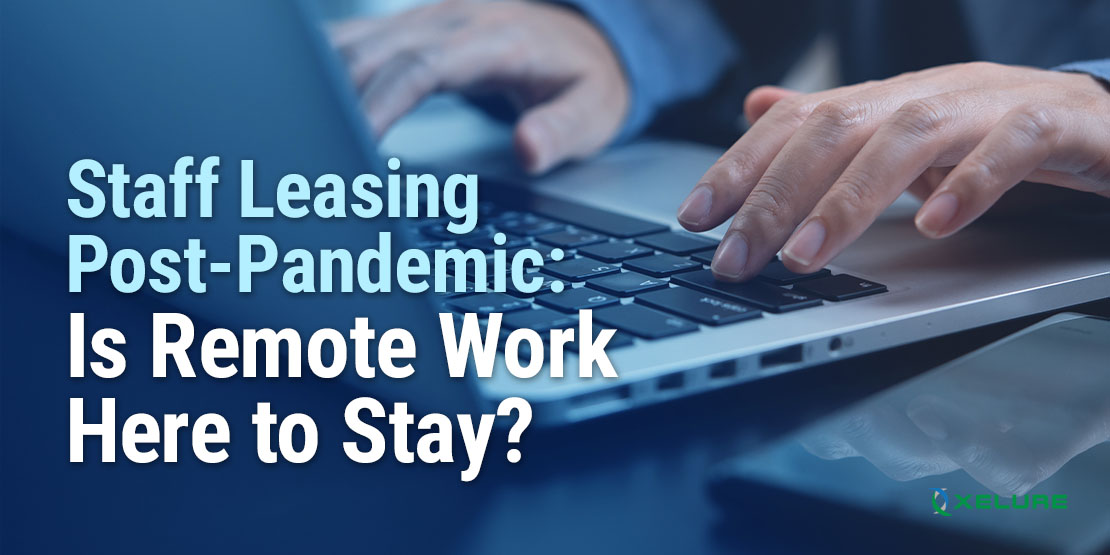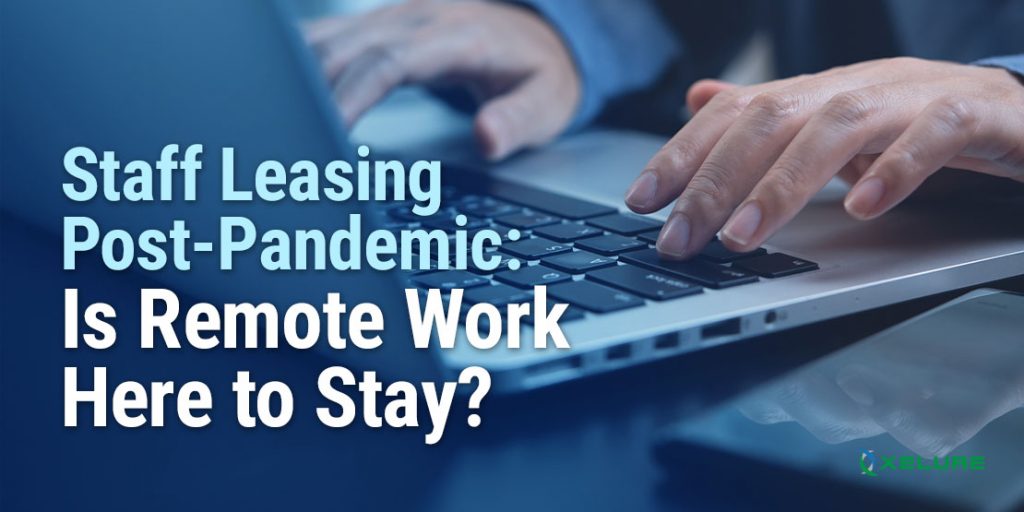At the height of COVID, businesses all over the world adjusted to the ‘new normal’ offering more flexible work solutions to employees to weather the storm and even continue growing amid the global pandemic. Fast forward to 2023 and ‘new normal’ is just… normal—with outsourcing and remote work spearheading the new ways businesses approach hiring and work setups in a post-pandemic world.
In this article, we’ll answer the question: Is staff leasing still effective post-pandemic?
Staff leasing companies like Xelure equip businesses with skilled workers without them having to go through the hassle of traditional hiring, allowing them to scale up or down as needed much easier. Stay tuned for our full article on staff leasing soon.
Throughout the pandemic, this has become almost synonymous with remote work, as outsourcing companies focused on providing the necessary infrastructure and support for remote work during the COVID years.
The question is: Will this transition to remote work arrangements continue post-pandemic?
The quick answer is Yes. Remote work is expected to continue in some form even as industries begin to normalize after the pandemic. Here are some of the biggest reasons why remote staff leasing is here to stay.
Lower Costs
One of the major considerations for companies opting to hire a remote workforce is the significantly lower operating costs. Not having to maintain a physical office was in fact one of the biggest things that kept many businesses afloat throughout the pandemic. Similarly, studies have shown that employees prefer working remotely, as it lowers time and resource requirements and enables them to work in the comfort of their own homes—remote work has become the preferred and prevalent setup for employees across various industries, despite strong calls to get back to the office.
Lesser Risks, More Flexibility
Another consideration for companies is how outsourcing can address many risks to businesses, some of which arose during COVID and continue to be felt at present day. Whether you are leasing key staff or fully outsourcing, these non-traditional staffing methods provide a more flexible workforce with much lesser risks. Even industry giants are turning to temporary and remote staff to continue to grow—the current big tech layoffs and ongoing banking crisis demonstrate this.
Not long after lockdown restrictions were lifted, big tech companies like ecommerce giant Amazon and media conglomerate Disney were forced to layoff thousands of employees, reversing their mass hiring to meet the blistering demand brought about by the pandemic.
Similarly, the US banking crisis and financial uncertainty in general can have long-lasting impacts on the staffing industry. During financial crises, businesses are—justifiably—more cautious about their hiring and staffing decisions.
Businesses that are aware of trends like these and know when to pivot to staff leasing providers have a much greater chance of continued success and flexibility.
Improved Scalability
Another key consideration in favor of staff leasing is the ability for companies to ramp up or dial back their workforce as necessary. This was demonstrated by many ecommerce companies turning to leased staff and remote workers to take advantage of the pandemic headwind, where online shopping activity reached its peak in the US and most other marketplaces.
This is particularly true for many startups that cropped up throughout the pandemic, as business process outsourcing and leasing remote workers from offshore providers enables them to grow without their bottom line looking bad.
How Has Staff Leasing Evolved Over the Years?
Much like all other staffing models, staff leasing has its own set of uncertainties.
One such risk is the skillset of the leased employees and whether businesses are getting the best resources possible when leasing workers. As it is important for companies to carefully evaluate the skills and experience of the workers provided by the staff leasing company and make sure they are a good fit. The easiest win for businesses is to work with reputable and highly rated staff leasing providers like Xelure which use rigorous screening methods and careful resource allocation to equip employees with the means to excel at their roles and help you grow.
As it stands, many companies still believe in the old idea of outsourcing, which usually involves outsourcing projects to take advantage of the lower costs, without giving up core services and valuable IP. In such cases, outsourced employees are often those who, at the time of taking on a client, are free to be assigned to such client. This old way involves vetting processes that lack rigor, with some employees ending up not being a good fit for the clients. Conversely, companies like Xelure are heavily invested in the new concept of outsourcing, that is, hiring employees specifically for the needs of clients. This new concept of outsourcing involves a way more rigorous hiring process because the hires become part of the client business’s team, not merely of the staff leasing company who hired them. This evolved model enables staff leasing providers to offer brands specialized skills that may not have been previously available in-house.
Another key difference between traditional outsourcing and modern staff leasing models is that the former often involves massive outsourcing firms with employees often bouncing from project to project and do not stay with a client for long. For companies like Xelure, retention is much higher because the employees are performing work specifically tailored to the needs of the clients.
Pro Tip for Outsourcing in 2023 and Beyond
For businesses looking to outsource workers to staff leasing providers, it’s important to know the right questions to ask, one of them being: What is the experience of the management team?
The reason is simple. To hire smarter, you’ll want to look for firms that not only have the physical manpower to assign to the projects you outsource, but also one whose experience aligns perfectly with your niche or industry. Xelure, for example, flexes some strong muscles when it comes to staff leasing financial technology and cybersecurity, as our C-level team and management personnel have ample experience in those fields.
Another reason is that the barrier to entry to set up a business process outsourcing company has gone low, hence it’s much easier to fall into the trap of working with BPO firms whose employees lack the necessary experience required to excel in the outsourced roles. All said, the post-pandemic world presents a lot of opportunities and some challenges for companies looking to lease staff and build remote teams. In many ways, the changes in the job market have made staff leasing more and more important in scaling a business. What’s for sure is staff leasing and remote work are here to stay, and they are surely the best ways to optimize and scale a business moving forward, pandemic or otherwise.





